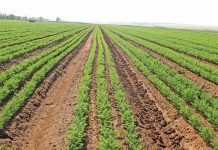Beleaguered ostrich farmers were sent to the ditches again as a new ostrich meat export ban grips the country.
The local ostrich industry has already suffered massive losses this year due to an outbreak of the H5N2 virus (avian influenza) in April. This new ban was imposed less than a week after exports from all South African areas outside the Klein Karoo could resume at the start of October.
The provincial department of agriculture issued a statement in which Gerrit van Rensburg, Western Cape minister of agriculture and rural development, said this new temporary ban is due to a positive test for H5 strain on a farm in the Mossel Bay area.
According to Anton Kruger, chief executive of the South African Ostrich Business Chamber, the industry is still awaiting results from further tests which would determine whether this was indeed a case of the H5N2 virus. The H5N2 result was obtained during routine testing conducted on a farm near Vleesbaai.
“The one positive thing from all of this is the assurance that the tests and measures put in place by the industry to detect virus outbreaks as early as possible are working very well,” said Kruger. The EU recently granted a rezoning application from the industry, which allowed for exports to resume on 10 October for all areas except the Klein Karoo. The EU requires a three month disease-free period before exports can be resumed.
This new ban halts all ostrich meat exports from South Africa. Since the start of the outbreak, more than 34 000 birds have been culled in the Klein Karoo and the industry has been suffering financial losses to the tune of R108 million per month due to the export ban.
According to Kruger, farmers earn on average R500 less per ostrich when sold on the local market compared to earnings from exports. “The prices vary a lot from one abattoir to the next but the price for ostrich meat sold on the local market is usually between R18/kg to R30/kg, while farmers earn between R38/kg to R44/kg ton meat hat gets exported to the EU.
“The difference in prices for meat sold locally and abroad, plus the difference in prices paid for the skin, adds up to a total of roughly R500 per ostrich,” explained Kruger. He told Farmer’s Weekly that the sixth round of testing in the Klein Karoo started on 17 October and the industry was still hopeful that this would reveal no positive results for the H5N2 virus. – Denene Erasmus








